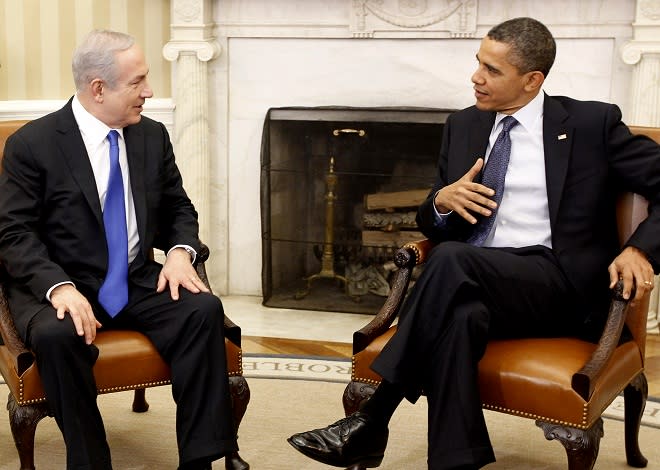 The Envoy
The EnvoyObama to Netanyahu: Give Iran diplomacy more time

President Barack Obama and Israeli Prime Minister Benjamin Netanyahu held one of their more studiously cordial meetings at the White House Monday. But the concerted effort to project a united front--after a few previous prickly encounters--did little to mask the fact that there are genuine differences and tensions in the allies' views on how to deal with the Iran nuclear program and in what time-frame, analysts said.
"Both the prime minister and I prefer to solve this diplomatically," Obama said at the top of his three-hour meeting with the Israeli leader, echoing the thrust of his comments to the pro-Israel lobby group the American Israel Public Affairs committee (AIPAC) Sunday. The administration has continued to push diplomacy as the key to getting Iran to agree to curb its nuclear program.
"Ultimately Iran has to make the decision to move in that direction," Obama said, adding that if that fails, however, "When I say all options are on the table, I mean it."
"Israel and America stand together," Netanyahu said Monday. But Israel reserves the right to defend itself, he asserted: Israel is "the master of its fate," he said.
"Really it's in the interest of both Netanyahu and Obama to try to put some of the past tension behind them," Haim Malka, a Middle East analyst at the Center for Strategic Studies told Yahoo News in an interview Monday. "And I think on the PR-front the atmospherics have been good."
"Obama, in his speech to AIPAC, made a strong case for his ongoing commitment to Israel's security; but at same time he was clear about maintaining his own position and not getting locked into Netanyahu's red lines," Malka continued. "I think Netanyahu came here with the clear objective to move the president on the red lines and on the timeline."
But Obama held his ground, Malka noted. "The president said very clearly —he thinks there's a chance for a diplomatic route," he said.
"In essence, [Obama's statements] are a mix of reassurance ('We've got this') and dissuasion ('Don't do this')," Colin Kahl, former deputy assistant secretary of defense for the Middle East in the Obama administration, told Yahoo News by email Monday
American and Israeli leaders publicly agree that Iran will not be permitted to get a nuclear weapon—if need be, both say they will resort to military force to destroy Iran's known enrichment and ballistic missile facilities. But they disagree about whether diplomacy or force would do more to set back Iran's nuclear effort, and how much time there is to act.
"The U.S. takes the attitude that we want to permanently solve the problem of the Iran nuclear program," Patrick Clawson, deputy director of research at the Washington Institute for Near East Policy, told Yahoo News in an interview. "And the only way to [permanently solve the problem] is to persuade the Iranians to come to an agreement."
Obama and Netanyahu disagree however about the virtue of further negotiations with Iran.
Netanyahu "truly believes that negotiations with Iran will merely lead to stalling and delaying tactics and cover for continuation of their work on their nuclear program," a Washington Middle East expert said on condition of anonymity.
Netanyahu has called publicly for a complete halt to Iranian enrichment before any new negotiations with Iran are undertaken--a condition the United States seems unlikely to accept.
But the United States is also devising a confidence-building measure to test whether the Iranians are serious about returning to international nuclear talks, Clawson noted. Under the proposed confidence-building measure that American diplomats have been quietly discussing with international partners, Iran would be asked agree to halt its 20 percent enrichment in exchange for a suspension of new UN Security Council sanctions. (Some Iran experts say Iran may also be asked to send out its stockpile of 20 percent enriched uranium in exchange for support for a Tehran reactor that produces isotopes used to treat Iranian cancer patients.)
The confidence-building measure is seen as a more achievable, intermediate step that can help reduce the tremendous mistrust between Iran and the international community, Clawson explained, while helping put "time back on the clock" for possible negotiations to a long term deal.
More popular Yahoo! News stories:
• Obama sees difficult months ahead in Iran standoff
• Iran votes in parliamentary polls amid growing tension
• U.S. announces diplomatic breakthrough with North Korea
Want more of our best national security stories? Visit The Envoy or connect with us on Facebook or on Twitter.
Want more of our best political stories? Visit The Ticket or connect with us on Facebook, follow us on Twitter, or add us on Tumblr. Handy with a camera? Join our Election 2012 Flickr group to submit your photos of the campaign in action.

